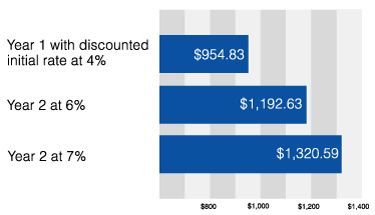We’re in the process of buying a town house (met with another mortgage broker last week) and we’re trying to be as informed as we possibly can. This weekend while we were out of town, I was looking up information about mortgages and reading paperwork from the bank we’re looking at using to get our mortgage.

Compare with different lenders to get a good mortgage interest rate.
I wanted to share some information that I found that I thought might be useful.
What is my mortgage interest rate?
Your mortgage interest rate is the annual rate you pay for the mortgage you take out.
What kind mortgages in regards to interest rates can I take out?
Some options available for the home buyers:
- A fixed rate (popular terms include 15 and 30 year): The interest rate remains the same through the length of the mortgage. This can be a smart choice if you want predictable payments over the long term of the mortgage.
- An adjustable rate (better known as an ARM): The interest rate changes at specific times and the interest rate is subject to market conditions. There is a lifetime cap and annual limits to give some protection to radical increases, but your mortgage payments can still increase dramatically.
There are different repercussions based on your decision, so plan carefully.
How do rates on an ARM adjust?
Depending on your mortgage, your interest rate will be based on an index like the Prime Rate and the margin specified in your loan. The margin is the percentage point(s) above the index that the lender determines with your mortgage.
Each loan is unique, so check to see what different mortgage lenders are offering. Your credit score can also be a factor in determining the amount the lender has for your margin.
Therefore your mortgage payments can rise and drop based on the index. Here is some information from the Consumer Handbook on Adjustable-Rate Mortgages on payment shock with ARMs with an example to illustrate it:
Payment shock may occur if your mortgage payment rises sharply at a rate adjustment. Let’s see what would happen in the second year if the rate on your discounted 4% ARM were to rise to the 6% fully indexed rate.
As the example shows, even if the index rate were to stay the same, your monthly payment would go up from $954.83 to $1,192.63 in the second year.
Suppose that the index rate increases 1% in one year and the ARM rate rises to 7%. Your payment in the second year would be $1,320.59.
That’s an increase of $365.76 in your monthly payment. You can see what might happen if you choose an ARM because of a low initial rate without considering whether you will be able to afford future payments.
If you have an interest-only ARM, payment shock can also occur when the interest-only period ends. Or, if you have a payment-option ARM, payment shock can happen when the loan is recast.
What are hybrid ARMs?
These loans have features of both fixed and adjustable rate loans. There is an initial period where the interest rates are fixed and then it will fluctuate based on the index and margin. I’ve usually seen this expressed in advertisement and sales pitches as 5/1 loans or 7/1 loans.
Taking the 5/1 as an example, the numbers reveal two things:
- The 1st number is the length of the fixed period in years
- The 2nd number is the time period of adjustments. If this is a 1, for example, then it adjusts annually.
There are some other ways of numbering the ARM loans, but the above is the most common.
Check to see if there are any penalties if you decide to refinance your arm loan or convert it to a fixed rate.
What mortage loan type is right for me?
Run the numbers and find out for yourself what will work with your budget and goals. Here are some things to keep in mind:
- How long are you planning on staying in your house? If you’re planning on moving relatively soon, renting may be a better option. Try the NY Times calculator and see how long you would have to stay in your house to break even when comparing to renting.
- Do you want stability with your mortgage payments? Fixed mortgages remain the same for the life of the mortgage loan. Adjustable rates can be lower for a time period, but no one can predict rates over the long term.

Run the numbers on the different mortgage types and interest rates.
Source: Consumer Handbook on Adjustable-Rate Mortgages
Your Thoughts
We applied for a 30 year fixed rate mortgage. We felt it was in our best financial interest to keep the interest rate steady. Right now the interest rate is relatively low, which is another bonus.
How about you? If you’re a home owner, what kind of mortgage did you get and why? If you’re planning on buying a home, what options are you looking at?
Photo Credit: pnwra

